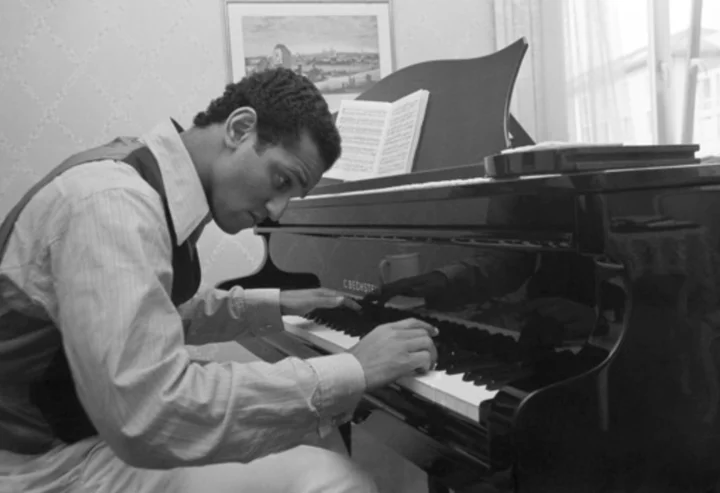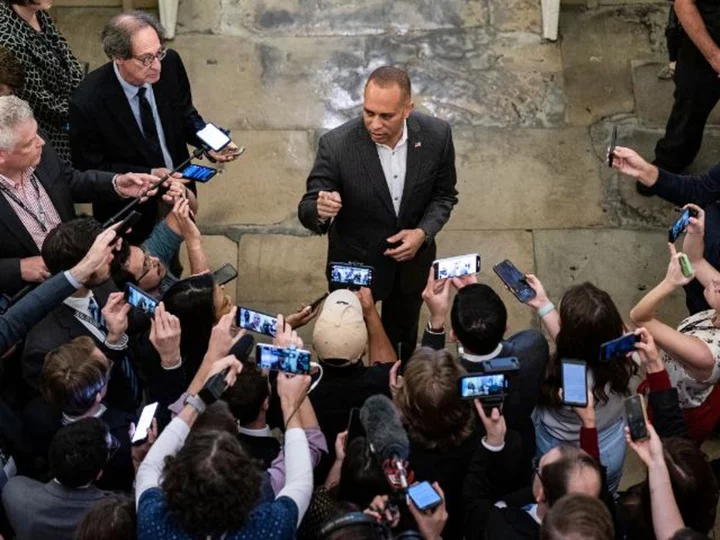BLOOMINGTON, Ind. (AP) — Pianist André Watts, whose televised debut with the New York Philharmonic as a 16-year-old in 1963 launched an international career of more than a half-century, has died. He was 77.
Watts died Wednesday at his home in Bloomington of prostate cancer, his manager, Linda Marder, said Friday. Watts joined the faculty of the Indiana University Jacobs School of Music in 2004. He said in 2016 that he had been diagnosed with prostate cancer.
Watts won a Philadelphia Orchestra student competition and debuted when he was 10 in a children’s concert on Jan. 12, 1957, performing the first movement of Haydn’s Concerto in D major.
He studied under Genia Robinor and made his New York Philharmonic debut in a Young People's Concert led by music director Leonard Bernstein on Jan. 12, 1963, a program televised three days later on CBS.
“Now we come to a young man who is so remarkable that I am tempted to give him a tremendous buildup, but I'd almost rather not so that you might have the same unexpected shock of pleasure and wonderment that I had when I first him play,” Bernstein told the audience. “He was just another in a long procession of pianists who were auditioning for us one afternoon and out he came, a sensitive-faced 16-year-old boy from Philadelphia ... who sat down at the piano and tore into the opening bars of a Liszt concerto in such a way that we simply flipped.”
Bernstein conducted Watts and the orchestra in Liszt's Piano Concerto No. 1.
“What Mr. Watts had that was exceptional was a delicacy of attack that allowed the piano to sing,” Raymond Ericson wrote in The New York Times.
Watts so impressed Bernstein that the conductor chose him to replace an indisposed Glenn Gould and play the Liszt concerto twice at Philharmonic Hall a few weeks later. Within months, he had earned a recording contract and became among the most prominent pianists.
“When I'm feeling unhappy, going to the piano and just playing gently and listening to sounds makes everything slowly seem all right,” he said on a 1987 episode of ”Mister Rogers’ Neighborhood."
Born in Nuremberg, Germany, on June 20, 1946, to a Hungarian mother and a Black father who was in the U.S. Army, Watts moved with his family to Philadelphia.
“When I was young, I was in the peculiar position with my school chums of not being white and not being Black, either,” Watts told The Christian Science Monitor in 1982. "Somehow I didn’t fit in very well at all. My mom said two things, ‘If you really think that you have to play 125% to a white’s 100% for equal treatment, it’s too bad. But fighting will not alter it.’ And, ‘If someone is not nice to you, it doesn’t have to be automatically because of your color.’
“(That advice) taught me that when I’m in a complex personal situation, I don’t have to conclude it is a racial thing. Therefore, I think I have encountered fewer problems all along the way.”
Watts' career was interrupted on Nov. 14, 2002, when he was stricken by a subdural hematoma before a scheduled performance with the Pacific Symphony at the Orange County Performing Arts Center in Costa Mesa, California. He had surgery in Newport Beach.
Watts then had surgery in 2004 to repair a herniated disk that caused nerve damage in his left hand. He made the last of more than 40 Carnegie Hall appearances with the Orpheus Chamber Orchestra in 2017. He had been scheduled to appear at the New York Philharmonic this November to mark the centennial of “Young People's Concerts.”
He was nominated for five Grammy Awards and won Most Promising New Classical Recording Artist in 1964 for the Liszt concerto with Bernstein and the New York Philharmonic. He was nominated for a 1995 Emmy Award for Outstanding Cultural Program and received a 2011 National Medal of Arts and National Humanities Medal from then-President Barack Obama.
Watts is survived by his wife Joan Brand Watts, stepson William Dalton, stepdaughter Amanda Rees and seven step-grandchildren. There were no immediate funeral plans.









